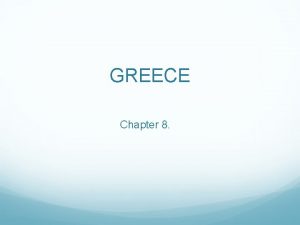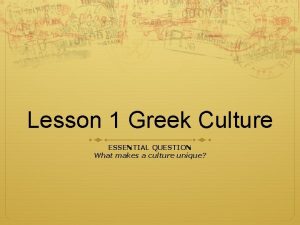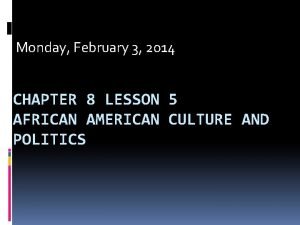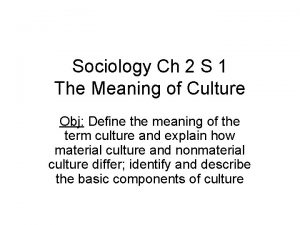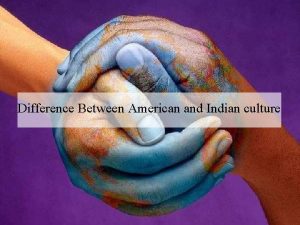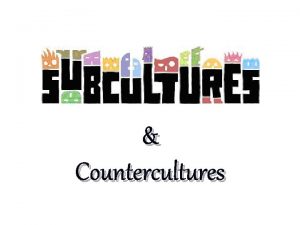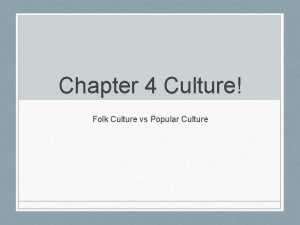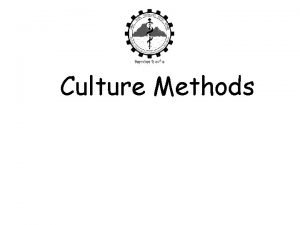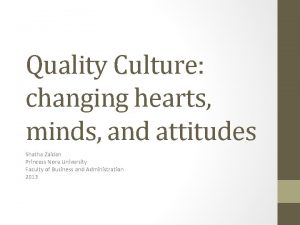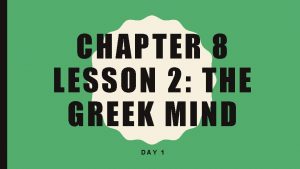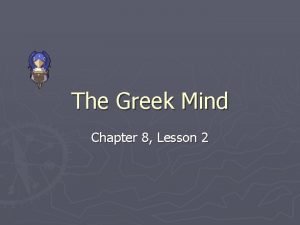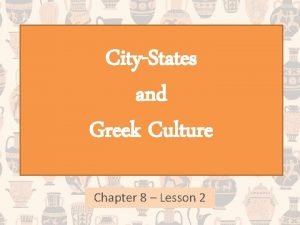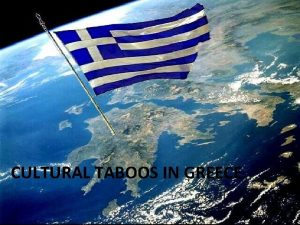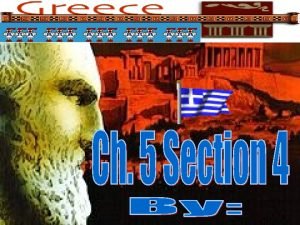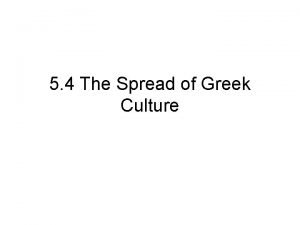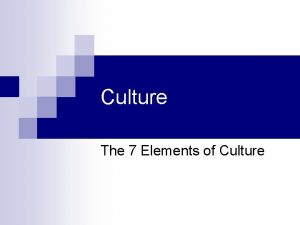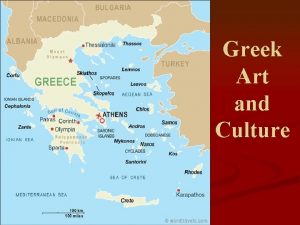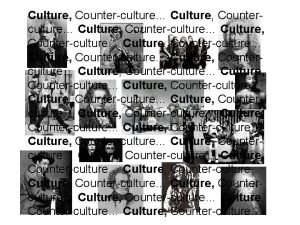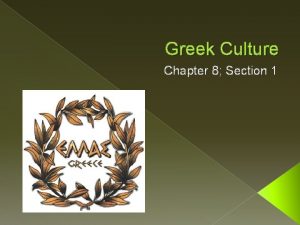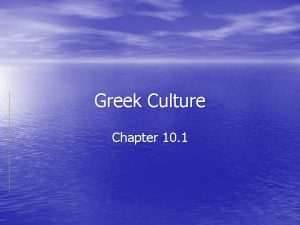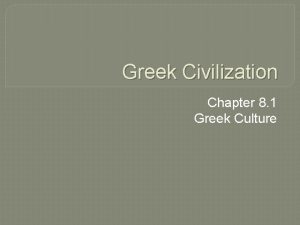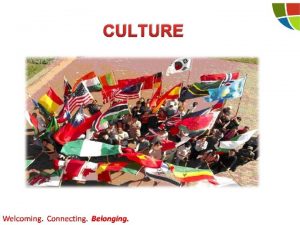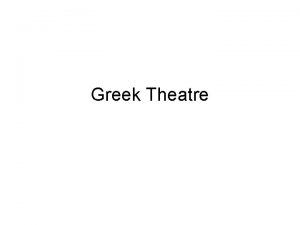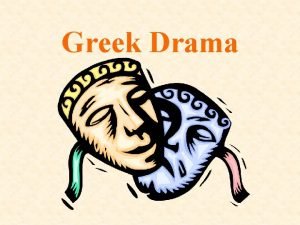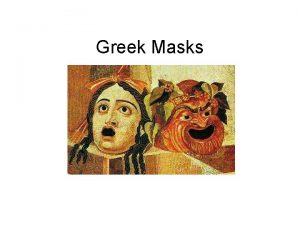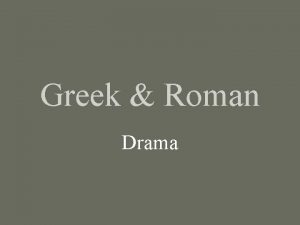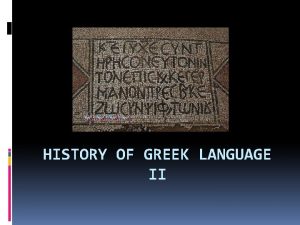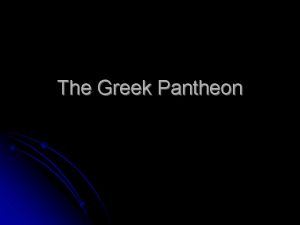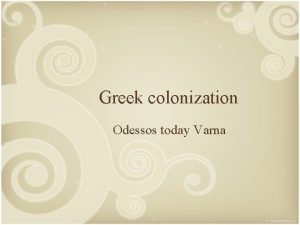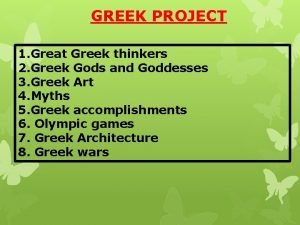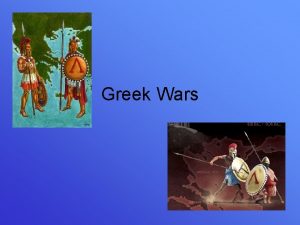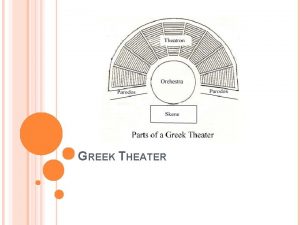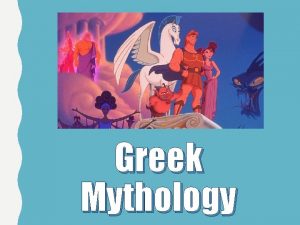Greek Culture Chapter 8 Lesson 1 You Greek
































- Slides: 32

Greek Culture Chapter 8, Lesson 1

► You Greek Beliefs should have an understanding of citystates. § Independent states made up of a city and land surrounding them. § It separated people politically ► The people of Greece had a connection through culture. § Spoke the same language. § Shared beliefs and customs. § Believed the same myths (traditional stories about gods and heroes. ) which expressed religious beliefs of the ancient Greeks.

Who Were the Greek Gods? ► Like many others in the ancient world, the Greeks believed in gods and goddesses. § However, they did not see them as all-powerful beings. ►They did have great power, but they looked and acted like human beings. ►They married and had children, and sometimes acted like children themselves when they played pranks on each other. ►Since they had human qualities they Greeks did not fear them.

Who Were the Greek Gods? They believed the 12 most important gods and goddesses lived on Mount Olympus. § Greece’s highest mountain. § It was protected by a gate of clouds. ►The gods and goddesses could go in and out as they pleased, but humans were not allowed in. ► Some of the gods were: § Zeus – King of the gods on Mount Olympus. § Athena – goddess of wisdom and crafts. § Apollo – god of sun and poetry. § Aphrodite – the goddess of love. § Ares – the god of war. § Poseidon – the god of the seas and earthquakes. ►


Who Were the Greek Gods? ► Zeus was worshipped as the chief god by all Greeks. ► Each city-state also chose one god or goddess as their protector. ► They would win their favor through rituals. § An action that is part of a religious ceremony. ►The gods were worshipped in temples and homes. ►Prayed and offered gifts to the god. § Through rituals they hoped the god or goddess would reward them.

Who Were the Greek Gods? Festivals to honor the gods and goddesses were an important part to Greek life. § Each city-state held public feasts and sacrifices. § Athletes took part in athletic competitions. ►They were for the “greater glory of Zeus. ” ►Held in the city of Olympia and were known as the Olympic Games. ►It began in 776 B. C. , and took place for more than 1, 000 years. ►The first modern Olympics were held in 1896 in Athens. ► The Greeks believed the god would be pleased if people showed their skill in the arts, in athletic games, or thinking. ►

► Greeks Greek Oracles believed every person had a fate or destiny. § Certain events are going to happen no matter what you do. § Also believed in prophecy (prediction about the future). § The Greeks believed that the gods gave prophecies to warn people about the future in time to change it. ► They did these things be visiting an Oracle. § A sacred shrine where a priest or priestess spoke for a god.

Greek Oracles ► The most famous one was the temple of Apollo at Delpi. § The oracle chamber was located deep inside. ►It also had an opening in the floor where the volcanic smoke hissed from a crack in the earth. ►A priestess sat on a stool and listened to questions. § The priests translated her answers. ► State leaders or their messengers traveled to Delphi to ask advice from the Oracle of Apollo.


Epics and Fables Greek poems and stories are some of the oldest literature in Western civilization. § They were often used by Europeans and Americans as models for writing their own literature. ►England’s William Shakespeare is an example, borrowing Greek plots and settings for his many dramas and often organized the dramas in much the same way the Greeks did. ► The first Greek stories were epics. § Two of the great epics from ancient Greece were Iliad and the Odyssey written by Homer during the 700 s B. C. § Homer based these on stories about a war between Greece and Troy (Once existing where northwestern Turkey is today. ►

The Trojan Horse the Iliad, a prince of Troy falls in love with Helen, the wife of a Greek king and kidnaps her. ► The angered Greeks attack Troy in revenge but are unable to break through the thick walls surrounding the city. ► They are able to get in by tricking the Trojans. ► In § They construct a large hollow wooden horse where the best of Greeks soldiers were hiding while the rest sail away.

► The Trojan Horse Trojans believed they have won and the giant horse is a victory prize. § The Trojans roll the horse into the city and at night, the Greeks get out and open the city gates for the rest of the Greek army who returned during the dark of night. ► The Greeks are then able to capture the city, save Helen, and take her home.


► The Trojan Horse Odyssey tells the story of Odysseys (oh -DYS-ee-uhs) who was a Greek hero of the Trojan War. ► It tells of his long trip home after the fall of Troy. § He encounters storms, monsters, and witches along the way and takes him 10 years before finally returning home to his wife. ► Today people use the word odyssey to describe a long, exciting journey.

The Trojan Horse Greeks believed that the Iliad and the Odyssey were more than just stories. ► The § They looked at epics as real history as it gave them an ideal past with a cast of heroes. § It was believed that Homer’s stories taught courage and honor as well as loyalty to friends and value the relationship between husband wife. § It showed heroes striving to be the best they could be and § Heroes fought to protect their honor and their families honor and these heroes became models for Greek Boys.

► Aesop’s Fables was believed to be a story teller around 550 B. C. who told stories such as “The Fox and the Grapes” and “The Boy Who Cried Wolf. ” § We now know he probably didn’t exist, but these stories did and are collectively known as Aesop’s Fables. § Fables are short stories that teach a lesson. ► In most of Aesop’s Fables animals spoke and acted like people. § The stories were often funny and showed human weaknesses and strengths and each ended with a useful truth, or moral.

► Another Aesop’s Fables famous story was “The Hare and the Tortoise. ” § It told the story of a speedy hare and slow moving tortoise participating in a race. § The hare was so far ahead he decided to nap. § The tortoise kept moving and passes the sleeping rabbit and wins the race. ► The moral of the story is “slow and steady wins the race. ” Other phrases included: § “It is easy to dislike something you cannot have” § “Appearances can be deceiving. ”

“Appearances can be deceiving”

► These Aesop’s Fables stories were told during a time known as the Golden Age of Greece. § During this time period art, philosophy, architecture, and literature flourished. ► For 200 years, Aesop’s fables were a part of Greek oral tradition. § Stories were passed from generation to generation by word of mouth and would take many years before these stories were written down. ► Since Aesop’s fables have been translated into many languages it has been read by people around the world even today.

The Impact of Greek Drama ► The ancient Greeks created and performed the first dramas. § A drama is performed by actors, usually on a stage. § Many of today’s movies, plays, and shows are dramas. ► Greek dramas were divided into two categories: tragedy and comedy. § Tragedy – character struggles to overcome hardships but does not succeed. § Comedy – The story ends happily and today, the word comedy is used to describe a story filled with humor.


The Impact of Greek Drama ► During the fifth century B. C. four writers emerged as the best of Greeks dramatists, or writers: ► Aeschylus (EHS-kuh-luhs) § Earliest greek dramatists. § Wrote a set of three plays called the Oresteia that tells about a Greek king’s return from the Trojan War and the troubles that strike his family. ►It is a story about revenge and murder and shows that one evil action can lead to another. § Although the play ends tragically, good triumphs over evil in the end.

The Impact of Greek Drama ► Sophocles (SAH-fuh-kleez) § Great Athenian writer. § Accepted suffering as a real part of life. § Stressed courage and understanding § In his play Antigone (an-TIH-guh-nee), he questions whether it is better to obey order or to do what one believes to be right. ► Euripides (uh-RIH-puh-deez) § Unlike Aeschylus and Sophocles, he wrote of ordinary people and often showed the suffering caused by war.

The Impact of Greek Drama ► In theaters today, men, women, and children could all be actors. § This was not the case in ancient Greece, as only men could be actors. § Even female characters were played by men. ► Aristopanes (ar-uh-STAH-fuh-neez) § Most famous writer of Greek comedies. § Poked fun at the leaders and issues of his day. § Encouraged people to think and laugh. § Much of his work included jokes, just like TV comedy includes today.


How Greek Drama Developed ► Drama was more than entertainment in ancient Greece. § It was part of festivals and showed loyalty to a city-state. § In early dramas, a group of performers known as the chorus, presented the story through singing and dancing. § Dramas later used multiple actors on stage. § Storied were then created using action and conflicts (fight or disagreement) among the characters.

Greek Art and Architecture ► The ancient Greeks excelled in the arts and architecture. § Created works that expressed the ideals of reason, balance, and harmony. § The characteristic of Greek art became the artistic style that we now call classical. § Classical Greek art set standards of beauty that people still admire today. ► They constructed beautiful buildings. § Every city-state had a temple dedicated to a god or goddess. § Temples such as the Parthenon included a central room that had statues of Greek gods.


Greek Art and Architecture ► Large graceful columns supported many Greek buildings. § Some famous buildings in Washington D. C. such as the White House and the Capitol, have Greek columns. ► Sculpture decorated many Greek temples. § The human body was the favorite subject of Greek artists. § They attempted to show the ideal beauty in perfect human form.

The Lincoln Memorial

 Chapter 8 lesson 1 greek culture
Chapter 8 lesson 1 greek culture Lesson 1 greek culture answer key
Lesson 1 greek culture answer key Chapter 12 lesson 3 culture of the middle ages
Chapter 12 lesson 3 culture of the middle ages Chapter 8 lesson 5 african american culture and politics
Chapter 8 lesson 5 african american culture and politics Example of material culture
Example of material culture Sociologists define a symbol as
Sociologists define a symbol as Batch culture vs continuous culture
Batch culture vs continuous culture Fed-batch
Fed-batch Characteristics of collectivism
Characteristics of collectivism Difference between american culture and indian culture
Difference between american culture and indian culture Stab and stroke culture
Stab and stroke culture Folk culture and popular culture venn diagram
Folk culture and popular culture venn diagram Vocational subculture
Vocational subculture Chapter 4 folk and popular culture
Chapter 4 folk and popular culture Anaerobic medium
Anaerobic medium Homework due today
Homework due today In an inert organizational culture,
In an inert organizational culture, Lawn culture method
Lawn culture method Describe lawn culture and surface plating
Describe lawn culture and surface plating Laying the foundation for a quality culture
Laying the foundation for a quality culture Surface culture deep culture and esol
Surface culture deep culture and esol Thinkers who created new bodies of knowledge
Thinkers who created new bodies of knowledge Chapter 8 lesson 2 the greek mind
Chapter 8 lesson 2 the greek mind Lesson 2 the greek city states
Lesson 2 the greek city states What is an overall state of well-being or total health
What is an overall state of well-being or total health Greek taboos
Greek taboos Ancient greek cultural values
Ancient greek cultural values What city became the center of hellenistic greek culture?
What city became the center of hellenistic greek culture? The spread of greek culture
The spread of greek culture Lesson 1: electrical safety culture
Lesson 1: electrical safety culture What are the seven components of culture?
What are the seven components of culture? Lesson 2 settlement culture and government of the colonies
Lesson 2 settlement culture and government of the colonies Lesson 1 electrical safety culture
Lesson 1 electrical safety culture
